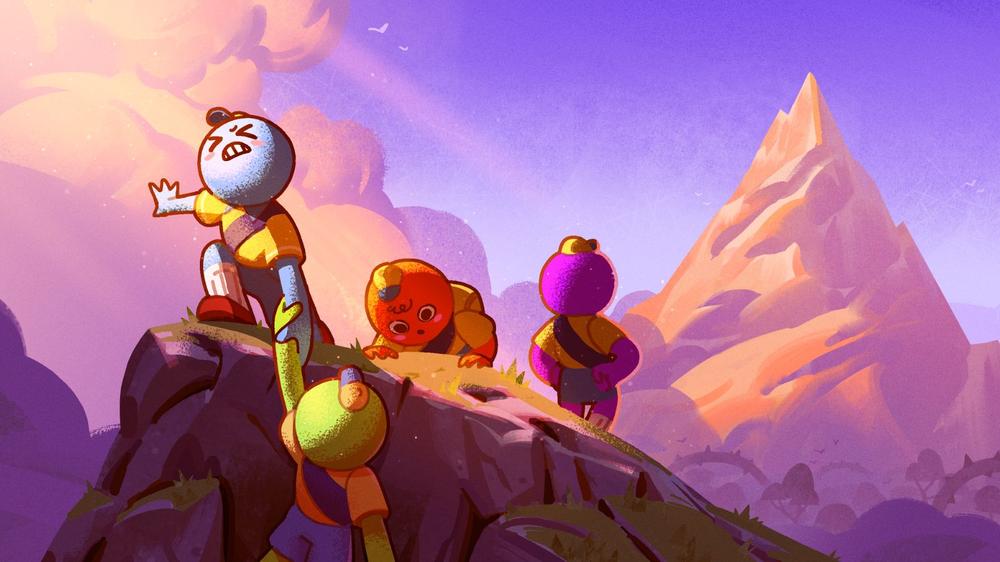Peak is the latest hit in the rapidly developing “friendslop” genre, inexpensive co-op games that are designed to be played with friends. In an industry of ballooning development costs, games like Peak are succeeding by creating something that’s simple and fun.
And, with only around a month of work, dev teams Aggro Crab and Landfall teamed up to create a game that’s consistently pulling over 100k concurrent players.
It turns out that Peak was made because a bunch of devs saw “friendslop” games like Lethal Company and decided it’d be fun to make one with their friends at Landfall, people who had a wealth of experience with games in the genre. Friendslop was the objective from the very beginning.
We spoke with Caelan Pollock, the dev at Aggro Crab who originally came up with the idea for Peak, to ask about the game’s unusual formation between two different dev teams. In speaking with him, it became apparent that Peak meant a lot more to Aggro Crab’s devs than just being a new game they made.
Aggro Crab embraced friendslop and made Peak
So, what exactly is friendslop? What does this term that people have been throwing around on the internet for the past six months actually mean? To be honest, it’s kind of hard to say, but Caelan took a crack at defining it.
“When I hear the term friendslop, I think it’s something that assumes that you and your friends will make up the difference in comedy and interaction in what the game is lacking,” he explained.
While this bizarrely named sub-genre has been brewing for a few years, he agreed that Lethal Company was the game that really solidified it.
“We’re in this phase right now where I would be very comfortable putting all of these games, including Peak, into a broad genre, whether you call that ‘friendslop’ or something less derogatory. These games are popular, they’re very clearly inspired by each other, and they’re iterating very quickly. Lethal Company, I think, innovated by boiling down the mechanics.”
Survival horror game Lethal Company – released in early access in 2023 – is deceptively simple. The core mechanics and objective are easy to pick up and understand, and it’s built to generate moments that scare you while providing genuine comedy for you and your friends.
“The comedy that happens in Lethal Company is not a mistake, it happens because they designed these creators in a way that caused it, Caelan explained. “And then you get R.E.P.O., which comes off as a much more polished game in a lot of ways, but their big innovation focuses on the items and what the items do and having those affect your experience as much as the enemies.”
The term ‘friendslop’ can appear dismissive of the genre, especially considering that most of these games have a cheap price tag. They’re treated by some as a lower class of entertainment than big budget AAA experiences. But is a game being easier and cheaper to make than a AAA project really a bad thing?
“We love the term friendslop, I hate to admit it,” Caelan said.
“Before this term even started seeing widespread use, we were making fun of Landfall and calling their games friendslop. We were like, ‘We’re gonna get together and make a friendslop game.’ It didn’t have this literal negative tone to us because we just thought it was funny.”
So, if this is where the studio’s desire to make a game like Peak came from, how did they come up with the idea?
A strong friendship created something special
It’s very rare for two dev teams to team up and just make something, but Aggro Crab and Landfall were “fast friends” according to Caelan, although their approaches to game development are very different.
Landfall is more focused on the the desire to deliver on the core game mechanic, while Aggro Crab is more about the set dressing – the narrative, the themes, and the vibes. For them, it’s about finding what makes a concept endearing and bringing it to life in a way that’s easy to connect with.
These two studios working together allowed the team to cover each others’ weaknesses and rapidly make a high-quality title. And it all came about from a bunch of devs just hanging out in a hot tub.
“The original idea I will claim credit for. It was originally pitched in a hot tub in Sweden, and that idea was really just, ‘Let’s make a game about being lost scouts.’ That brings in some of these ideas from Content Warning, that brings in some of the stuff that’s been like, clearly on the rise in terms of popularity, and puts it in this world is really easy to role-play in.”
They took this lost scouts idea and ran with it, locked in for a month like Landfall previously had to make Content Warning, and came out with Peak. This freedom and inspiration to go make something with relatively low stakes is a key part of why this game succeeded.
“The past couple of years, we’ve been in a good position where we’re not instantly fighting for money, said Caelen. “Another Crab’s Treasure was successful enough that it gave us a little space. We weren’t thinking, ‘Oh, we are both good studios. If we team up, it’ll surely be a massive success.’ Especially compared to Content Warning, which we saw as a real lighting in a bottle type release.
“More than anything, we were just like, ‘Hey, we have this opportunity to collaborate with some of our good friends.’ It’s rare for anyone to have the opportunity to do this, either in terms of having the financial freedom or identifying this other group of people from another studio with whom they’d work well together with. The excitement behind being able to do a collab is something that’s pretty rare in the games industry.”
However, Aggro Crab didn’t necessarily come into the collab in great shape following the cancellation of a game they were working on for years. There’s more to Peak’s creation than just the game they made. The process of throwing caution to the wind and making something fun was also a way to work through the grief caused by letting go of an ambitious project that just wasn’t working out.
Making the most of a bad situation
Going Under was the very first game Aggro Crab released. And, though it wasn’t nearly as popular as Another Crab’s Treasure, it did well enough to fund that title’s creation. It’s a roguelike made by a team clearly disenfranchised with the sanitary and lifeless appearance of modern corporate art.
The smoothed out edges and big, simple character designs meant to disarm people now unsettle them in a world with increasing distrust in corporate entities, a dichotomy Going Under explores extensively.
Originally, Aggro Crab planned to take another crack at the subject matter with Going Under 2, but they ultimately cancelled it. Years of work were binned.
“We had a game that was cancelled that would have been Going Under 2,” Caelen lamented. That was another pretty large, 2-3 year project for us. Another’s Crab’s Treasure was three years plus some change, and we’d already been in this place where the team was clearly unmotivated.
“There’s always this kind of, like, postpartum depression, when you release something like Another Crab’s Treasure that you really put your whole heart and soul into and is deeply, deeply meaningful to you. Despite it being really well received, and me being really, really proud of that game… doing content updates for it was kind of miserable.
“Now that we’re starting to move on from [Another Crab’s Treasure], the idea of jumping into another massive project was really kind of brutal to everybody. So, part of what we’re doing right now is taking this opportunity to do what we want for a little bit. Allow ourselves to prototype things that are small and maybe we throw them away. Think about what a game looks like for us that isn’t so massive.
“As far as what the Peak endeavor taught us about this – it certainly taught us that [small games] can work. I’m always telling people to make small games. Don’t jump into game development with this grandiose idea of what you’re going to do. Nobody gets into music and decides they’re going to write a full orchestra piece as their first thing. It’s kind of funny that we had to learn that same lesson, too.”
Beauty in simplicity
One of the most interesting aspects of this game is its name. ‘Peak’ is so brilliantly simple, a name that gives the player a great idea of what the game’s about while also being incredibly in-tune with players’ sense of humor.
While the joke about this game being peak is an obvious one, the process of coming up with the one-word title was almost as long as the game’s development: About a month.
“It took us a long time to come up with the name Peak. We had solidified the name by the time we were done working on the game, but the game was in development for weeks before we knew. There were really no names that everybody liked, so we were throwing around like, much cheesier names. ‘So Peak’, ‘Is this Peak?’, ‘This is Peak’. I think what drew us to just calling it ‘Peak’ – well, I mean, those other names are obviously sh*t, but I think what drew us to it was that it felt like kind of an ego move.
“I mean, just the opportunity to call a game Peak and have it make sense in this moment in time where that’s just such a commonly used word, I think that’s just too much to pass up, right? Even minus the joke, I think it’s a great name for the game.”
There’s something to be said for how effortless the game’s virality is with a name like Peak. Rather than trying to force the joke, they let people make it themselves. That mentality is, in essence, what makes Peak successful.
Even if Going Under 2 never sees the light of day, part of the messaging the original game was going for exists in Peak. It’s a monument to what can happen when you throw away the idea of maximizing profits by so obviously selling the concept of a game to the largest audience possible.
In going back to basics, Peak and other friendslop games have re-discovered the joy of what made many people fall in love with video games in the first place: Having fun with your friends and discovering a game’s secrets for yourself.

 Goddess of Victory: Nikke takes over New York City in bizarre summer collab
Goddess of Victory: Nikke takes over New York City in bizarre summer collab